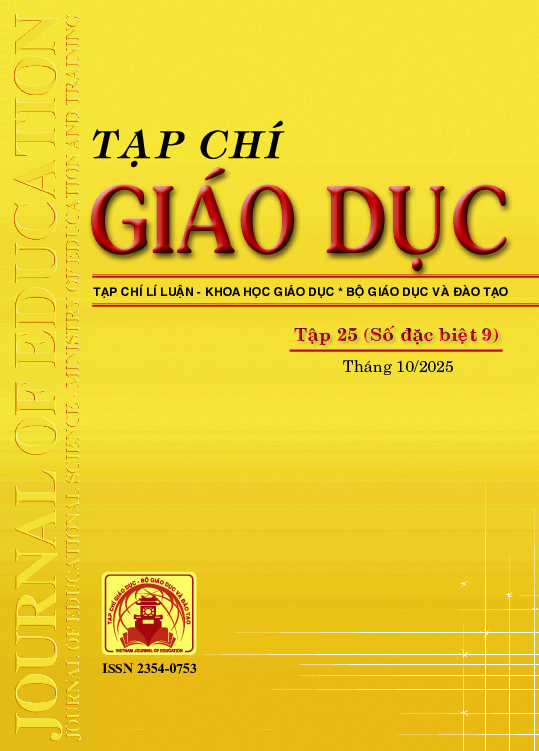Thực trạng ứng phó với cảm xúc lo lắng của cha mẹ có con rối loạn phổ tự kỉ tại khu vực Đông Nam Bộ
Tóm tắt
Autism spectrum disorder is a neurodevelopmental disorder that has lifelong impacts on many areas of functioning. This study aims to explore the coping strategies used by parents of children with autism spectrum disorder in response to anxiety. The research sample consists of 300 parents of children with autism spectrum disorder from six provinces in the Southeastern region of Vietnam. The findings indicate that these parents employ a wide range of coping strategies to manage anxiety. Among them, two adaptive strategies proactive-adaptive coping and seeking social support are the most commonly used. In contrast, spiritual coping, passive-maladaptive coping, and substance use are used less frequently. Statistically significant differences were found between fathers and mothers, as well as between primary and partial caregivers, in how they cope with anxiety. Mothers tend to use more positive strategies such as proactive-adaptive coping and seeking social support, whereas fathers are more likely to resort to substance use. Parents who are the primary caregivers tend to adopt more positive coping strategies, while those who are only partially involved in caregiving are more prone to substancebased coping. These findings form the basis for recommending strategies to improve how parents of children with autism spectrum disorder cope with anxiety.
Tài liệu tham khảo
American Psychiatric Association (2013). Diagnostic and statistical manual of mental disorders: DSM-V. APA.
APA Dictionary of Psychology (2023). Anxiety. https://dictionary.apa.org/anxiety
Carver, C. S. (1997). You want to measure coping but your protocol's too long: Consider the Brief COPE. International Journal of Behavioral Medicine, 4(1), 92-100.
Foody, C., James, J. E., & Leader, G. (2015). Parenting stress, salivary biomarkers, and ambulatory blood pressure: A comparison between mothers and fathers of children with autism spectrum disorders. Journal of Autism and Developmental Disorders, 45, 1084-1095.
Hastings, R. P. (2003). Child behaviour problems and partner mental health as correlates of stress in mothers and fathers of children with autism. Journal of Intellectual Disability Research, 47(4-5), 231-237. https://doi.org/10.1046/j.1365-2788.2003.00485.x
Hastings, R. P., Kovshoff, H., Brown, T., Ward, N. J., Espinosa, F. D., & Remington, B. (2005). Coping strategies in mothers and fathers of preschool and school-age children with autism. Autism, 9(4), 377-391.
Lazarus, R. S., & Folkman, S. (1984). Stress, Appraisal and Coping. Springer.
Pargament, K. I., Smith, B. W., Koenig, H. G., & Perez, L. (1998). Patterns of positive and negative religious coping with major life stressors. Journal for the Scientific Study of Religion, 710-724.
Pargament, K. I., Koenig, H. G., & Perez, L. M. (2000). The many methods of religious coping: Development and initial validation of the RCOPE. Journal of Clinical Psychology, 56(4), 519-543.
Solberg, M. A., Gridley, M. K., & Peters, R. M. (2022). The factor structure of the brief cope: A systematic review. Western Journal of Nursing Research, 44(6), 612-627.
Tamres, L. K., Janicki, D., & Helgeson, V. S. (2002). Sex differences in coping behavior: A meta-analytic review and an examination of relative coping. Personality and Social Psychology Review, 6(1), 2-30.
UNICEF Việt Nam, Tổng cục Thống kê (2018). Điều tra quốc gia về người khuyết tật Việt Nam 2016-2017. NXB Thống kê.
Van Steijn, D. J., Oerlemans, A. M., Van Aken, M. A., Buitelaar, J. K., & Rommelse, N. N. (2014). The reciprocal relationship of ASD, ADHD, depressive symptoms and stress in parents of children with ASD and/or ADHD. Journal of Autism and Developmental Disorders, 44(5), 1064-1076.
WHO (2023). Autism. https://www.who.int/news-room/fact-sheets/detail/autism-spectrum-disorders
Đã Xuất bản
Cách trích dẫn
Số
Chuyên mục
Giấy phép

Tác phẩm này được cấp phép theo Ghi nhận tác giả của Creative Commons Giấy phép quốc tế 4.0 .












